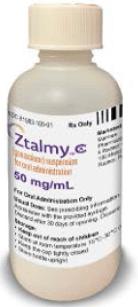Ganaxolone Disease Interactions
There are 4 disease interactions with ganaxolone.
Antiepileptics (applies to ganaxolone) suicidal tendency
Moderate Potential Hazard, Moderate plausibility. Applicable conditions: Depression, Psychosis
Antiepileptic drugs (AEDs) have been associated with an increased risk of suicidal thoughts or behavior in patients taking these drugs for any indication. Pooled analyses of 199 placebo-controlled clinical studies involving the use of 11 different AEDs showed that patients receiving AEDs had approximately twice the risk of suicidal thinking or behavior compared to patients receiving placebo. AEDs should be administered cautiously in patients with depression or other psychiatric disorders; phentermine-topiramate should be avoided in patients with history of suicidal attempts or active suicidal ideation. The risk of suicidal thoughts and behavior should be carefully assessed against the risk of untreated illness, bearing in mind that epilepsy and many other conditions for which AEDs are prescribed are themselves associated with morbidity and mortality and an increased risk of suicidal thoughts and behavior. Patients, caregivers, and families should be alert to the emergence or worsening of signs and symptoms of depression, any unusual changes in mood or behavior, or the emergence of suicidal thoughts or behavior. If patients have symptoms of suicidal ideation or behavior, a dosage reduction or treatment discontinuation should be considered.
Ganaxolone (applies to ganaxolone) alcoholism
Moderate Potential Hazard, Moderate plausibility.
Ganaxolone can cause somnolence and sedation; other CNS depressants (including alcohol) could potentiate these effects. Caution is advised when using this agent in patients with alcohol disorders. Patients should be monitored for somnolence and sedation, and patients should be advised not to drive or operate machinery until they know how ganaxolone will affect them.
Ganaxolone (applies to ganaxolone) hepatic impairment
Moderate Potential Hazard, Moderate plausibility. Applicable conditions: Liver Disease
The effect of liver dysfunction on the pharmacokinetics of ganaxolone has not been studied; since this drug undergoes hepatic clearance, liver dysfunction can increase ganaxolone exposure. Caution is advised in patients with impaired liver function; they should be monitored for side effects and may require a reduced dosage of ganaxolone.
Ganaxolone (applies to ganaxolone) renal impairment
Minor Potential Hazard, Moderate plausibility. Applicable conditions: Renal Dysfunction
The effect of renal dysfunction on the pharmacokinetics of ganaxolone has not been studied; however, since renal excretion is a minor elimination pathway, impaired renal function is unlikely to increase ganaxolone exposures significantly. Caution is recommended in these patients.
Switch to professional interaction data
Ganaxolone drug interactions
There are 414 drug interactions with ganaxolone.
Ganaxolone alcohol/food interactions
There is 1 alcohol/food interaction with ganaxolone.
More about ganaxolone
- ganaxolone consumer information
- Check interactions
- Compare alternatives
- Side effects
- Dosage information
- During pregnancy
- Drug class: gamma-aminobutyric acid analogs
- Breastfeeding
- En español
Related treatment guides
Drug Interaction Classification
| Highly clinically significant. Avoid combinations; the risk of the interaction outweighs the benefit. | |
| Moderately clinically significant. Usually avoid combinations; use it only under special circumstances. | |
| Minimally clinically significant. Minimize risk; assess risk and consider an alternative drug, take steps to circumvent the interaction risk and/or institute a monitoring plan. | |
| No interaction information available. |
See also:
Further information
Always consult your healthcare provider to ensure the information displayed on this page applies to your personal circumstances.


